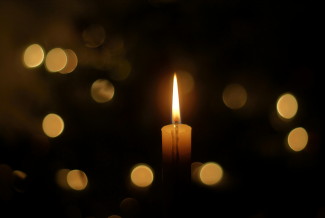Excerpted from How Will We Welcome the Prince of Peace? An Advent Guide for Lectionary Year A from the NC Council of Churches.
Again the Lord spoke to Ahaz, saying, Ask a sign of the Lord your God; let it be deep as Sheol or high as heaven. But Ahaz said, I will not ask, and I will not put the Lord to the test. Then Isaiah said: “Hear then, O house of David! Is it too little for you to weary mortals, that you weary my God also? Therefore the Lord himself will give you a sign. Look, the young woman is with child and shall bear a son, and shall name him Immanuel. He shall eat curds and honey by the time he knows how to refuse the evil and choose the good. For before the child knows how to refuse the evil and choose the good, the land before whose two kings you are in dread will be deserted.
Isaiah 7:10-16 ___________________________________________________________________________________
The first chapters of Isaiah give the name “Mighty God” its proper meaning and create a setting for God’s coming into the world in Christ as divine intervention. The verses depict a population who have fallen far away from identifying as God’s people and disconnected from their roles and responsibilities bestowed up on them. They need to be rescued and saved from themselves.
This makes me reflect on how a similar scenario is taking place in our country with regards to our consumptive lifestyles in relation to the realities of a changing climate. Impacts of global warming are occurring at an ever-increased rate while our daily actions and consumer choices continue to support the corporate dominance of our fossil fuel-based culture. We need a kind of “divine intervention” to guide us back into our role as caretakers of creation.
El Gibbor, the original Hebrew word for “Mighty God,” can be literally translated as hero – our rescuer – the one who brings order out of chaos. No matter how we have failed as a people, God’s power is perfect.
It is at the moment when Ahaz thinks he might be left to suffer that Isaiah announces God is coming in the form of a newborn.
The significance of this timing again rings true for us with regards to climate change. God has been rejected by his people’s pollution of creation and although there has been begging and pleading for us to live a righteous and peaceful existence, we have been unable to stop the cycle of destruction on our own. So God must come to be with us so we can begin anew.
It is all too easy to sink into despair as the realities of climate change play out in the news and in our lives. Through the lens of faith, hope triumphs over despair.
Rather than considering global warming as the greatest threat to our existence we must place trust in our hero and recognize the signs that this is the very moment to be reborn, to create an entirely new way of being and behaving as God’s people. The season of Advent is in celebration of this very anticipation, the more we believe – the more beautiful and peaceful our world will become.

